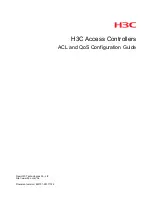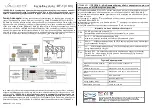Preliminary Rev. 0.8 2/12
Copyright © 2012 by Silicon Laboratories
SiM3U1xx
This information applies to a product under development. Its characteristics and specifications are subject to change without notice.
SiM3U1xx
High-Performance, Low-Power, 32-Bit Precision32™
USB MCU Family with up to 256 kB of Flash
32-bit ARM® Cortex™-M3 CPU
-
80 MHz maximum frequency
-
Single-cycle multiplication, hardware division support
-
Nested vectored interrupt control (NVIC) with 16 levels of
interrupt priority
Memory
-
32–256 kB Flash, in-system programmable
-
8–32 kB SRAM (including 4 kB retention SRAM)
-
External bus interface supports up to 16 MB of external mem-
ory and a parallel LCD interface with QVGA resolution
Power Management
-
Low drop-out (LDO) regulator
-
Power-on reset circuit and brownout detectors
-
5-to-3.3 V voltage regulator supports up to 150 mA to drive the
device directly from USB; no off-chip regulator required
-
Programmable external regulator supports up to 3.6 V,
1000 mA
-
Multiple power modes supported for low power optimization
Clock Sources
-
Internal oscillator with PLL: Fine frequency resolution up to
80 MHz; spread-spectrum mode for reduced EMI
-
USB internal 48 MHz oscillator supports crystal-less operation
-
Low power internal oscillator: 20 MHz and 2.5 MHz modes
-
Low frequency internal oscillator: 16.4 kHz
-
External oscillators: Crystal, RC, C, CMOS and RTC Crystal
-
Flexible clock divider: Reduce frequency by up to 128x from
any clock source
128/192/256-bit Hardware AES Encryption
-
Hardware-supported Electronic Codebook (ECB), Cipher-Block
Chaining (CBC) and Counter (CTR) algorithms
-
All cipher operations can be performed without any firmware
intervention for a set of 4-word blocks (up to 32 kB)
16/32-bit CRC
-
Hardware support for common 32-bit and 16-bit polynomials
Timers/Counters
-
2 x 32-bit or 4 x 16-bit timers with capture/compare
-
2 x 16-bit, 2-channel counters with capture/compare/PWM
-
16-bit, 6-channel counter with capture/compare/PWM and
dead-time controller with differential outputs
-
16-bit low power timer/pulse counter operational in the lowest
power mode
-
32-bit real time clock (RTC) with multiple alarms
-
Watchdog timer
Current-to-Voltage Converter
-
Supports up to 6 mA input range
Supply Voltage
-
2.7 to 5.5 V (regulator enabled)
-
1.8 to 3.6 V (regulator disabled)
Low Power Features
-
85 nA current mode with voltage supply monitor enabled
-
350 nA current mode with RTC (internal oscillator)
-
620 nA current mode with RTC (external oscillator)
-
10 µs wakeup (lowest power mode); 1.5 µs analog setting time
-
275 µA/MHz active current
-
Clocks can be gated off from unused peripherals to save power
2 x 12-Bit Analog-to-Digital Converters
-
Up to 28 input channels
-
Up to 250 ksps 12-bit mode or 1 Msps 10-bit mode
-
Single, simultaneous, and interleaving modes supported
-
Channel sequencer enables automatic multiplexing of multiple
channels without firmware intervention
-
Internal VREF or external VREF supported
2 x 10-Bit Digital-to-Analog Converters
-
DMA support for waveform generation
-
Four-word circular buffer to enable 12-bit mode
16-Channel Capacitance-to-Digital Converter
-
Supports buttons, sliders, wheels, and capacitive proximity
-
Fast conversion time; <1 µA wake-on-touch average current
Two Low-Current Comparators
-
Integrated 6-bit programmable reference voltage
-
400 nA current consumption in low power mode
16-Channel DMA Controller
-
Supports ADC, DAC, USB, I2C, I
2
S, SPI, USART, AES, EPCA,
capacitive sensing, external triggers, and timers
Up to 65 Flexible I/O
-
Up to 59 contiguous GPIO with two priority crossbars providing
flexibility in pin assignments; 12 x 5 V tolerant GPIO
-
Up to 6 programmable high drive capable (5–300 mA, 1.8–6 V)
I/O can drive LEDs, power MOSFETs, buzzers, etc.
Communication Interfaces
-
USB 2.0-compliant full speed with 10 endpoints, 2 kB buffer,
oscillator with automatic frequency correction, and transceiver;
no external components needed
-
2 x USARTs and 2 x UARTs with IrDA and ISO7816 SmartCard
-
3 x SPIs, 2 x I2C, I
2
S (receive and transmit)
On-Chip Debugging
-
Serial wire debug (SWD) and JTAG allow for full-speed, non-
intrusive debug
-
Serial wire viewer (SWV) available in 64 / 80 / 92-pin packages
-
Cortex-M3 embedded trace macrocell (ETM) in 80 / 92-pin
packages
Temperature Range: –40 to +85 °C
Package Options
-
QFN options: 40-pin (6 x 6 mm), 64-pin (9 x 9 mm)
-
TQFP options: 64-pin (10 x 10 mm), 80-pin (12 x 12 mm)
-
LGA option: 92-pin (7 x 7 mm)


















